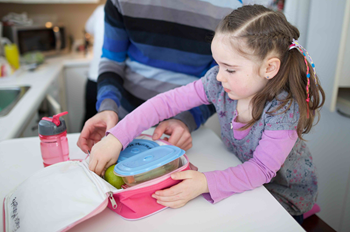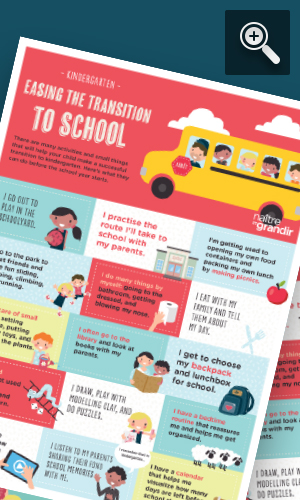Starting kindergarten can be stressful for your child. Here’s how you can help them!
When your child starts kindergarten, they experience a lot of changes all at once. This can make them feel a host of emotions, including stress. Fortunately, you can help them adjust to the new experiences ahead.
Starting school: A major change for your child
Even though your child may be excited to start kindergarten, they might also feel stressed and worried about being in an unfamiliar environment. This feeling is normal, since they’re about to experience a lot of new things.
Studies have shown that children are more sensitive than adults to stress caused by changes in their lives. This is partly because their brains are still developing and they trouble imagining how these events will unfold ahead of time. They also don’t know how to deal with stress.
To describe the elements that cause stress, studies use the word “N.U.T.S.” for Novelty, Unpredictability, Threat to the ego, and Sense of control. Starting kindergarten is an event that has all of the elements in this perfect stressful storm!
Here’s what can make starting school stressful for a child:
- Novelty: Starting kindergarten is a brand new situation. A child has to get used to everything—their new environment, new people, new friends, new routines, new rules, etc.
- Unpredictability: A child doesn’t know how their day is going to go. They don’t know if they will get along with their teacher and other students. Really, they don’t know what to expect from their new adventure at school.
- Threat to the ego: Before kindergarten, a child spends their days in an environment they know well. They feel comfortable and confident there. However, being in a new environment can make them lose confidence in their abilities. For example, they might be afraid of getting laughed at if they ask a question. They might also feel that they’re not as good as others while playing new games and learning new things.
- Sense of control: A lack of control can be stressful, and in kindergarten, a child has very little of it. They don’t choose their teacher or their classmates, they don’t choose the day’s activities, and they have no say in the day’s schedule.
How to tell if your child is stressed?
It’s not easy for a child to realize that they’re stressed and to talk about it. So, it’s important to watch for signs that your child is experiencing stress related to starting kindergarten. If you see these changes in their behaviour, they might be signs that they are under stress.
- They’re having trouble sleeping. For example, they’re having trouble falling asleep at night, waking up often, or having nightmares.
With your help, your child should feel less stressed about starting school.
- They suddenly don’t feel well and are experiencing headaches, stomachaches, nausea.
- They start developing tics such as blinking, twitching their nose, or sniffling.
- They’re more sensitive and seem to cry more. They’re also more irritable and impatient and seem to get mad at the slightest thing.
- They’re being less cooperative with tasks and routines (getting dressed, brushing their teeth, etc.).
- They’re eating less than usual.
- They’re asking a lot of questions about school and imagining distressing situations such as being locked in the classroom or bathroom alone.
- They’re having a hard time concentrating. For example, they’re forgetting things and often staring into space.
- There seems to be a regression in their development. For example, they start chewing on their sleeves or shirt collar, wetting the bed again or talking like a baby; or they might get reattached to a blankie they left behind some time ago.
Tips for reducing school stress
You can help reduce your child’s stress and make school a more positive experience for them. The idea is to give them some control over the situation, reduce the novelty and unpredictability of the day’s events, and build up their confidence.
Before school starts
- Be there with your child the first time they visit the school. This is an opportunity for them to see the classrooms and teachers. It will also give you a chance to learn more about what a day in kindergarten is like, which will help you explain to your child what they can expect from a day at school.
- Walk or bike past the school with your child from time to time. You can also take them to play in the schoolyard outside of school hours to get them used to the environment.
- Find out who some of their classmates will be. You can arrange to have one of them over for a playdate. This way, they’ll already have a friend when they start kindergarten.

- Let your child choose their backpack and lunchbox. This will give them a sense of control over what’s happening in their life.
- Give your child small responsibilities (putting away their clothes or toys, putting on their coat, setting the table, etc.). This promotes their autonomy and gives them confidence.
- Go to the library together and borrow books about starting kindergarten. Since some of these stories are funny, it might help make light of the situation.

- Talk to your child about the things that won’t change. For example, it can be reassuring for them to know that Dad will always be there pick them up at the end of the day, just like before.
- Go to the neighbourhood park regularly. By playing with other kids, your little one can also make new friends who will go to the same school as them.
- Accept any regressions that might arise while your child adjusts to school. For example, don’t get mad at them if they start wetting the bed again. Instead, tell them that you understand that they’re going through a lot of changes right now, and that you know these accidents won’t last forever.
- Talk to your child about starting kindergarten. For example, ask them how they imagine their class and teacher will be like and how they feel when they think about school. By helping your child put words to the emotions they’re feeling, you can better understand what is worrying them so you can reassure them.
After school starts
- When you get home from school, take a moment to talk about the day with your child. Ask open-ended questions. For example: “Tell me about something you enjoyed at school today.” You can also ask them to talk about something they found more difficult and help them come up with solutions to make it better next time.
Stay calm when your child talks about their fears. Take their fears seriously, but don’t overreact. If you have any concerns about what they’re saying, speak with their teacher.
- Be sure to get your child moving when they get home from school, such as by going outside to play. Being physically active will allow them to release any tension that’s had a chance to accumulate over the course of the day.
- Do quiet evening activities to help prepare them for bedtime. If they sleep well, it will be easier for them to manage their emotions and adapt to new situations.
- Tell them about some of your favourite memories from school. You can show them pictures of you and your school when you were their age. Your child will be comforted to know that you’ve been there and that you understand what they’re going through.
- During the first few weeks of school, don’t demand quite as much from your child, and allow them a bit more free time than usual. For example, to help them at the end of the day, you can let them leave the table earlier than usual and take their plate for them. Let them know that you’re doing it to help, since you know how tiring starting kindergarten can be.
- Learn to manage and reduce your own stress so that you can be available for your child and be more patient.
Things to keep in mind
-
Starting kindergarten can be a stressful time for a child.
-
A change in your child’s behaviour might be a sign that they’re experiencing stress related to starting kindergarten.
-
You can help ease your child’s concerns.
| Research and copywriting: Nathalie Parent, psychologist
Research and copywriting: The Naître et grandir Team
Updated: June 2022
|
Photos: Nicolas St-Germain
Sources and references
Note: The links to other websites are not updated regularly, and some URLs may have changed since publication. If a link is no longer valid, please use search engines to find the relevant information.
Websites -
ABRACADABRA. literacy.concordia.ca
-
Association québécoise des psychologues scolaires. aqps.qc.ca
-
Centre for Studies on Human Stress. humanstress.ca
-
Centre de transfert pour la réussite éducative du Québec. ctreq.qc.ca
-
Comité régional pour la valorisation de l’éducation (CREVALE). crevale.org
-
Encyclopedia on Early Childhood Development. “School readiness.” child-encyclopedia.com
-
Fédération des comités de parents du Québec. fcpq.qc.ca
-
Le Carrefour Pédagogique Montérégie-Estrie. “Mon enfant commence la maternelle : comment l’accompagner?” carrefourmonteregie.ca
-
Parent, Nathalie. Enfants stressés! Tout ce qu’il faut savoir pour aider votre enfant à grandir sereinement. Éditions Michel Lafon, 2019, 240 pp.
-
Ordre des psychoéducateurs et psychoéducatrices du Québec. ordrepsed.qc.ca
-
Ordre des psychologues du Québec. ordrepsy.qc.ca
-
Première Ressource – Aide aux parents. premiereressource.com
Books for parents -
Béliveau, Marie-Claude. Au retour de l’école… La place des parents dans l’apprentissage scolaire. 3rd ed., Éditions du CHU Sainte-Justine, 2014, 277 pp.
-
Béliveau, Marie-Claude. Mieux vivre l’école. Éditions du CHU Sainte-Justine, 2011, 204 pp.
-
Bourque, Solène. Petit Loup entre à l’école. Éditions Midi trente, 2012, 96 pp.
-
Bourque, Solène. Petit Loup se sent bien à l’école. Éditions Midi trente, 2015, 96 pp.
-
Charbonniaud, Marie. Préparer son enfant à l’école. Éditions du CHU Sainte-Justine, 2009, 88 pp.
-
Collective. Mon enfant à l’école : conseils et astuces pour l’accompagner de la maternelle à la 6e année. Les Éditions de l’Homme, 2015, 208 pp.
-
Duclos, Germain. Guider mon enfant dans sa vie scolaire. Éditions du CHU Sainte-Justine, 2006, 280 pp.
-
Duclos, Germain. La motivation à l’école, un passeport pour l’avenir. Éditions du CHU Sainte-Justine, 2010, 184 pp.
Books for kids -
Abécassis, Eliette and Adrien Siroy. Je ne veux pas aller à l’école. Éditions Thomas Jeunesse, 2013, 28 pp.
-
Blake, Stephanie. I Don’t Want to Go to School. Random House, 2009, 32 pp.
-
Delvaux, Nancy and Aline de Pétigny. Camille et la rentrée des classes. Éditions Hemma, 2015, 20 pp.
-
Latulippe, Martine and Nathalie Parent. La peur de Mathis. Mammouth rose, 2020, 32 pp.
-
Martel, Sophie and Christine Battuz. Sam apprend à aimer l’école. Une histoire sur… la motivation. Dominique et compagnie, 2010, 24 pp.
-
Rochefort, Josée and Jean Morin. La grande école. Ton album de la rentrée. Éditions Fonfon, 2011, 40 pp.
-
Wohnoutka, Mike. Dad’s First Day. Bloomsbury, 2015, 32 pp.
|